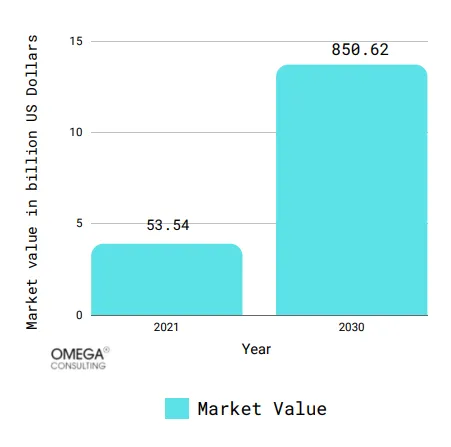- Industries
Industries
- Functions
Functions
- Insights
Insights
- Careers
Careers
- About Us
- Technology
- By Omega Team

As the field of artificial intelligence (AI) develops, it finds applications in many areas. The content marketing sector is one of them to realize its potential fully. Marketers often need help with what to write next to keep the content creation going. Technology can be leveraged to break through creative blocks and produce content automatically using AI tools. These tools are computer programs designed to expedite the writing process so that you can keep a steady stream of content ready for publication. Several distinct writing aids powered by AI are currently on the market. It’s essential to conduct a little research before committing to one of these tools because they all provide different benefits, such as writing creative content, rephrasing, spell checking, grammar checking, topic research, idea generation, completing forms,report writing, and document formatting.
Market Opportunities for AI Tools
The way humans interact with technology has been revolutionized by artificial intelligence (AI). AI’s use as a writing assistant is one of its most practical implementations. The AI Writing Assistant program is an artificial intelligence-enabled tool capable of producing text. They can be incorporated into various applications like email, chatbots, and other messaging programs. Some AI-powered solutions include grammar checkers that correct mistakes in spelling or suggest enhanced language; others track the user’s writing progress and generate new ideas as they go. AI Writing Assistance Software employs artificial intelligence to assist with writing. AI writing assistants are available with a variety of features and are frequently used for research, grammar, and tone checking, as well as for localization. Others are writing platforms that allow users to compose the entire article. They use natural language processing to analyze the text and provide real-time suggestions.
Exhibit 1: Global AI software market
The Artificial Intelligence (AI) Software Market was valued at USD 53.54 Billion in 2021 and is expected to reach USD 850.62 Billion by 2030, expanding at a CAGR of 41.30% from 2022 to 2030.

Exhibit 2: Global AI Writing Assistant market
The Artificial Intelligence (AI) Software Market was valued at USD 53.54 Billion in 2021 and is expected to reach USD 850.62 Billion by 2030, expanding at a CAGR of 26.94% from 2023 to 2030.

About Compose AI
Compose AI is a platform that generates personalized content suggestions for users using natural language processing and machine learning algorithms. Compose AI utilizes sophisticated AI technology, like GPT-3 from OpenAI, to create high-quality content suggestions corresponding to the user’s unique writing style and preferences. The platform analyzes a user’s writing style and preferences by their previous content and additional data, such as their intended audience and the purpose of the content.
Compose AI then employs this analysis to generate user-specific content suggestions, such as headlines, introductions, summaries, and more. Users can use Compose AI’s user-friendly interface to edit and fine-tune these suggestions to their preferences. The algorithms of Compose AI can also ensure that the content is well-structured, grammatically correct, and search engine optimized. The use of GPT-3 from OpenAI by Compose AI enables it to generate content suggestions that are more natural and human-like than conventional AI-generated content. GPT-3 is a cutting-edge language model that can generate high-quality text in various contexts, making it an ideal instrument for Compose AI’s content generation requirements. Overall, using sophisticated AI technology, such as GPT-3 from OpenAI, Compose AI enables it to generate personalized content suggestions tailored to the user’s unique writing style and preferences. By utilizing NLP and machine learning algorithms, Compose AI can assist users in streamlining content creation and producing high-quality, audience-engaging content.
Features of Compose AI
Idea Generation: It helps to generate new and innovative ideas for stories, blog posts, websites, varied research topics, and many more.
Auto-completion: Once we start typing, it automatically generates suggestions for you to complete the sentence.
Rephrasing text: It can rephrase the sentence, giving you suggestions for saying it differently.
Personalization: The application learns your writing style and suggests changes per your communication style. Integration It can be integrated with other applications for ease of use and efficient output.
Benefits of Compose AI
Writing efficiency and scalability: The advantage of utilizing these tools is the rapidity with which content is generated, which is significantly faster than human authors. An article of two pages may take a human writer about 30 minutes to an hour to complete, including research and composition, whereas AI can complete it in a few minutes. Compose AI increases the scalability of work by multiplying this writing efficacy by the number of articles to be written at any given time.
Cost-effectiveness: Human writers can cost hundreds of dollars for every content project, depending on factors such as the number of articles, the length of each article, the required technical expertise, and more. When developing straightforward, concise content, it may be more cost-effective to use AI writing tools such as Compose AI.
Idea generation: A common obstacle for human writers is producing unique and creative content on topics they need to be qualified experts in.
This obstacle requires extensive research and creative thought to develop the content. To overcome this, several AI tools can generate comprehensive outlines of what to include in the content and the topic’s key points. This relates to writing efficacy, as Compose AI can aid in overcoming writer’s block and generating content ideas.
Drawbacks of Compose AI
Limited viewpoint: It can only execute what it has been taught to do; consequently, its outputs are limited.
Inaccuracies: In addition to grammatical, syntactical, and punctuation errors, the generated content may contain inaccurate information and even the risk of plagiarism, as it scans the internet for information already available on a given topic.
Minimal creativity and emotion: It is ineffective at producing content with human emotion, nuance, conviction, and experiences of a particular person/brand.
Alternate AI writing tools
Writecream: Writecream offers over 35 tools, including email personalization, blog ideas, social media post captions, and headline generators.
HyperWrite: HyperWrite integrates with your existing writing process. It appears automatically on most online writing platforms, including Gmail, Google Docs, and others. The AI-powered writing assistant can help with any assignment. Whether writing an email, blog post, report, narrative, or anything else, HyperWrite’s artificial intelligence can generate, improve, rephrase, and customize your content in seconds.
Scalenut: Using Content AI from Scalenut, one can write, command, rephrase, and simplify. One can create and publish content on any subject with a single click. Save time and increase your productivity.
AISEO: With AISEO’s advanced AI, you can quickly and easily rephrase text and generate engaging, original content with just a few clicks. With their seven modes, you’ll be able to adapt the content to any circumstance, and their customization options will allow you to create content tailored as per the requirements.
Future Implications
Increased use of AI in content creation: As AI technology, such as GPT-3 from OpenAI, continues to advance, more businesses and individuals will likely utilize AI-powered content creation tools, such as Compose AI.
The evolution of NLP(Natural language processing): As more data becomes available to train AI algorithms, natural language processing will likely continue to advance, resulting in more precise and personalized content recommendations.
Possibilities for collaboration: GPT-3 from OpenAI by Compose AI provides users access to some of the most advanced language models and specialists in natural language processing, enabling collaboration and innovation.
Ethical concerns: As AI technology becomes more sophisticated and incorporated into content creation processes, it is crucial to consider the ethical implications of relying on AI-generated content and the possibility of unintended consequences.
Impact on the labor market
As more businesses and individuals adopt AI-powered content creation tools such as Compose AI, this may lead to job displacement or a shift in the categories of content creation jobs available. The implications of Compose AI in the future are complex. While the platform has the potential to disrupt the content creation industry and provide new opportunities for collaboration and innovation, it is essential to consider its ethical implications and potential impact on employment. However, as natural language processing and AI technology continue to advance, AI-powered content creation tools, such as Compose AI, will become more advanced and pervasive, potentially transforming how businesses and individuals approach content creation.
Conclusion
Compose AI is an advanced content creation platform that generates personalized content suggestions for users using AI algorithms, including GPT-3 from OpenAI. Despite its many advantages, it is crucial to consider the platform’s potential drawbacks, such as an over reliance on AI-generated content and the possibility of bias in AI algorithms. However, platforms like Compose AI will become even more sophisticated and widely used as AI advances, potentially transforming how businesses and individuals approach content creation. Before deciding whether to use Compose AI or similar AI-powered content creation tools, users must evaluate the benefits and drawbacks carefully.
Subscribe
Select topics and stay current with our latest insights
- Functions